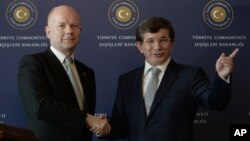ISTANBUL —
British Foreign Secretary William Hague said Wednesday that the differences between Iran and world powers over a potential deal to curb Tehran’s nuclear program are narrow and a deal is within reach. Hague is in Istanbul attending a ceremony marking the 10th anniversary of the 2003 Istanbul bombings, in which al-Qaida attacked the British consulate.
Speaking at a joint press conference, Foreign Secretary Hague played down the warning made Wednesday by Iran’s Supreme Leader Ayatollah Ali Khamenei, ahead of a resumption of talks in Geneva, that the country would not step back one iota from its nuclear rights.
“The differences between the parties are narrow, and I believe they can be bridged with political will and commitment, so this is an historic opportunity to build agreement on how to curb nuclear proliferation in the Middle East,” said Hague.
The Geneva talks between Tehran and world powers aim to resolve international concerns that Iran’s nuclear energy program is being used to develop weapons, a charge denied by Tehran.
After a first round of talks earlier this month, both sides claimed substantial progress had been made. Turkish Foreign Minister Ahmet Davutoglu gave his support to those efforts, saying they are aimed at ensuring a nuclear free region.
The Turkish foreign minister said he would discuss Iran’s nuclear energy program during his visit to Tehran later this month.
Ankara is trying to improve strained ties with its neighbors.
One key player in the region is Syria, whose ongoing conflict was also discussed during the meeting between the British and Turkish foreign ministers. Hague promised $750 million in aid for Syrian refugees and called on Damascus to immediately allow aid to reach all of Syria's regions.
The British foreign minister also paid tribute to Turkey for its humanitarian assistance and support for the Syrian opposition. Hague also said he will help curtail the threat of the growing presence of jihadist fighters -- some linked to al-Qaida -- within the Syrian opposition.
“We’ve discussed the specific threat from terrorism arising from the Syrian conflict, something else we have to confront and defeat,” he said.
Observers say there is growing concern that Ankara is not doing enough to stop jihadists using Turkey as a bridge into Syria. Turkey has a 900-kilometer border with Syria, and Ankara has been repeatedly accused of providing tacit, if not direct, support to extreme Islamic groups fighting the Syrian regime.
But Sinan Ulgen, a visiting scholar at Carnegie Europe in Brussels, says Ankara has changed its stance.
“Turkey is trying to convince its Western partners that it has disengaged from helping some of the more Islamist elements among [the] Syrian opposition,” said Ulgen. "This has been an area of criticism from Turkey’s partners in the West.”
In past few weeks, Turkish leaders have stepped up their condemnation of radical Islamic groups in Syria. Police raids have been carried out against al-Qaida cells in Turkey this past month, and Foreign Minister Davutoglu told reporters Wednesday that Turkey is committed to fighting terrorism anywhere in the world.
Speaking at a joint press conference, Foreign Secretary Hague played down the warning made Wednesday by Iran’s Supreme Leader Ayatollah Ali Khamenei, ahead of a resumption of talks in Geneva, that the country would not step back one iota from its nuclear rights.
“The differences between the parties are narrow, and I believe they can be bridged with political will and commitment, so this is an historic opportunity to build agreement on how to curb nuclear proliferation in the Middle East,” said Hague.
The Geneva talks between Tehran and world powers aim to resolve international concerns that Iran’s nuclear energy program is being used to develop weapons, a charge denied by Tehran.
After a first round of talks earlier this month, both sides claimed substantial progress had been made. Turkish Foreign Minister Ahmet Davutoglu gave his support to those efforts, saying they are aimed at ensuring a nuclear free region.
The Turkish foreign minister said he would discuss Iran’s nuclear energy program during his visit to Tehran later this month.
Ankara is trying to improve strained ties with its neighbors.
One key player in the region is Syria, whose ongoing conflict was also discussed during the meeting between the British and Turkish foreign ministers. Hague promised $750 million in aid for Syrian refugees and called on Damascus to immediately allow aid to reach all of Syria's regions.
The British foreign minister also paid tribute to Turkey for its humanitarian assistance and support for the Syrian opposition. Hague also said he will help curtail the threat of the growing presence of jihadist fighters -- some linked to al-Qaida -- within the Syrian opposition.
“We’ve discussed the specific threat from terrorism arising from the Syrian conflict, something else we have to confront and defeat,” he said.
Observers say there is growing concern that Ankara is not doing enough to stop jihadists using Turkey as a bridge into Syria. Turkey has a 900-kilometer border with Syria, and Ankara has been repeatedly accused of providing tacit, if not direct, support to extreme Islamic groups fighting the Syrian regime.
But Sinan Ulgen, a visiting scholar at Carnegie Europe in Brussels, says Ankara has changed its stance.
“Turkey is trying to convince its Western partners that it has disengaged from helping some of the more Islamist elements among [the] Syrian opposition,” said Ulgen. "This has been an area of criticism from Turkey’s partners in the West.”
In past few weeks, Turkish leaders have stepped up their condemnation of radical Islamic groups in Syria. Police raids have been carried out against al-Qaida cells in Turkey this past month, and Foreign Minister Davutoglu told reporters Wednesday that Turkey is committed to fighting terrorism anywhere in the world.











